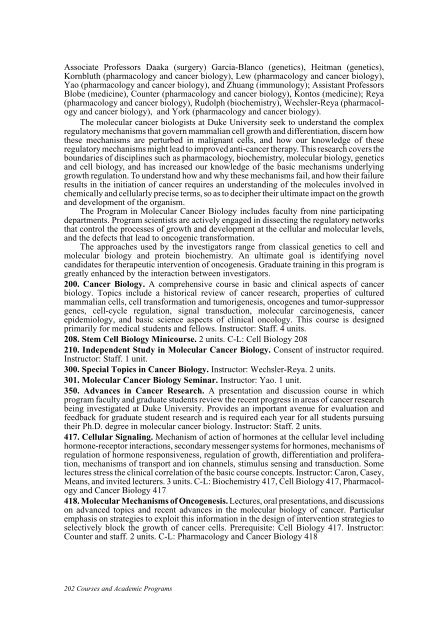2005-06 - Office of the Registrar - Duke University
2005-06 - Office of the Registrar - Duke University
2005-06 - Office of the Registrar - Duke University
Create successful ePaper yourself
Turn your PDF publications into a flip-book with our unique Google optimized e-Paper software.
Associate Pr<strong>of</strong>essors Daaka (surgery) Garcia-Blanco (genetics), Heitman (genetics),<br />
Kornbluth (pharmacology and cancer biology), Lew (pharmacology and cancer biology),<br />
Yao (pharmacology and cancer biology), and Zhuang (immunology); Assistant Pr<strong>of</strong>essors<br />
Blobe (medicine), Counter (pharmacology and cancer biology), Kontos (medicine); Reya<br />
(pharmacology and cancer biology), Rudolph (biochemistry), Wechsler-Reya (pharmacology<br />
and cancer biology), and York (pharmacology and cancer biology).<br />
The molecular cancer biologists at <strong>Duke</strong> <strong>University</strong> seek to understand <strong>the</strong> complex<br />
regulatory mechanisms that govern mammalian cell growth and differentiation, discern how<br />
<strong>the</strong>se mechanisms are perturbed in malignant cells, and how our knowledge <strong>of</strong> <strong>the</strong>se<br />
regulatory mechanisms might lead to improved anti-cancer <strong>the</strong>rapy. This research covers <strong>the</strong><br />
boundaries <strong>of</strong> disciplines such as pharmacology, biochemistry, molecular biology, genetics<br />
and cell biology, and has increased our knowledge <strong>of</strong> <strong>the</strong> basic mechanisms underlying<br />
growth regulation. To understand how and why <strong>the</strong>se mechanisms fail, and how <strong>the</strong>ir failure<br />
results in <strong>the</strong> initiation <strong>of</strong> cancer requires an understanding <strong>of</strong> <strong>the</strong> molecules involved in<br />
chemically and cellularly precise terms, so as to decipher <strong>the</strong>ir ultimate impact on <strong>the</strong> growth<br />
and development <strong>of</strong> <strong>the</strong> organism.<br />
The Program in Molecular Cancer Biology includes faculty from nine participating<br />
departments. Program scientists are actively engaged in dissecting <strong>the</strong> regulatory networks<br />
that control <strong>the</strong> processes <strong>of</strong> growth and development at <strong>the</strong> cellular and molecular levels,<br />
and <strong>the</strong> defects that lead to oncogenic transformation.<br />
The approaches used by <strong>the</strong> investigators range from classical genetics to cell and<br />
molecular biology and protein biochemistry. An ultimate goal is identifying novel<br />
candidates for <strong>the</strong>rapeutic intervention <strong>of</strong> oncogenesis. Graduate training in this program is<br />
greatly enhanced by <strong>the</strong> interaction between investigators.<br />
200. Cancer Biology. A comprehensive course in basic and clinical aspects <strong>of</strong> cancer<br />
biology. Topics include a historical review <strong>of</strong> cancer research, properties <strong>of</strong> cultured<br />
mammalian cells, cell transformation and tumorigenesis, oncogenes and tumor-suppressor<br />
genes, cell-cycle regulation, signal transduction, molecular carcinogenesis, cancer<br />
epidemiology, and basic science aspects <strong>of</strong> clinical oncology. This course is designed<br />
primarily for medical students and fellows. Instructor: Staff. 4 units.<br />
208. Stem Cell Biology Minicourse. 2 units. C-L: Cell Biology 208<br />
210. Independent Study in Molecular Cancer Biology. Consent <strong>of</strong> instructor required.<br />
Instructor: Staff. 1 unit.<br />
300. Special Topics in Cancer Biology. Instructor: Wechsler-Reya. 2 units.<br />
301. Molecular Cancer Biology Seminar. Instructor: Yao. 1 unit.<br />
350. Advances in Cancer Research. A presentation and discussion course in which<br />
program faculty and graduate students review <strong>the</strong> recent progress in areas <strong>of</strong> cancer research<br />
being investigated at <strong>Duke</strong> <strong>University</strong>. Provides an important avenue for evaluation and<br />
feedback for graduate student research and is required each year for all students pursuing<br />
<strong>the</strong>ir Ph.D. degree in molecular cancer biology. Instructor: Staff. 2 units.<br />
417. Cellular Signaling. Mechanism <strong>of</strong> action <strong>of</strong> hormones at <strong>the</strong> cellular level including<br />
hormone-receptor interactions, secondary messenger systems for hormones, mechanisms <strong>of</strong><br />
regulation <strong>of</strong> hormone responsiveness, regulation <strong>of</strong> growth, differentiation and proliferation,<br />
mechanisms <strong>of</strong> transport and ion channels, stimulus sensing and transduction. Some<br />
lectures stress <strong>the</strong> clinical correlation <strong>of</strong> <strong>the</strong> basic course concepts. Instructor: Caron, Casey,<br />
Means, and invited lecturers. 3 units. C-L: Biochemistry 417, Cell Biology 417, Pharmacology<br />
and Cancer Biology 417<br />
418. Molecular Mechanisms <strong>of</strong> Oncogenesis. Lectures, oral presentations, and discussions<br />
on advanced topics and recent advances in <strong>the</strong> molecular biology <strong>of</strong> cancer. Particular<br />
emphasis on strategies to exploit this information in <strong>the</strong> design <strong>of</strong> intervention strategies to<br />
selectively block <strong>the</strong> growth <strong>of</strong> cancer cells. Prerequisite: Cell Biology 417. Instructor:<br />
Counter and staff. 2 units. C-L: Pharmacology and Cancer Biology 418<br />
202 Courses and Academic Programs









